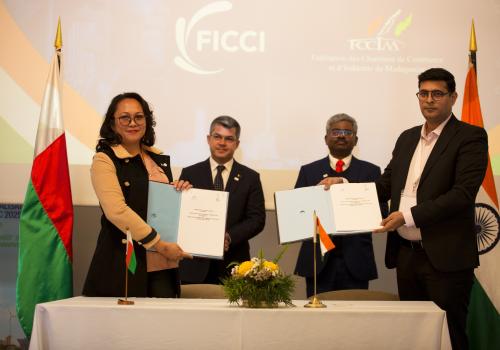The Federation of Indian Chambers of Commerce and Industry (FICCI), in collaboration with the Ministry of Industrialisation and Trade of Madagascar, the Embassy of India in Antananarivo, the SADC Business Council, the Southern African Development Community (SADC) Secretariat, the Federation of Indian Chambers of Commerce of Madagascar, and the Economic Development Board of Madagascar, organised the India–SADC Business Forum at the Novotel Convention & Spa in Antananarivo, during the SADC Industrialisation Week on 31st July 2025.
The forum brought together over 100 participants, including government officials, diplomats, business leaders, and industry stakeholders from across India and the Southern African Development Community (SADC). FICCI Business Mission to Madagascar comprised Indian companies from a wide range of sectors including manufacturing and packaging, agriculture, healthcare, logistics, mining, education, and skill development.
Hon. Mr. David Ralambofiringa, Minister of Industrialization and Trade of Madagascar, in his keynote address, emphasised the growing partnership between India and the SADC region. He underscored the importance of driving Madagascar’s economic growth by adding value to its products, particularly through agribusiness, the food processing industry, and strengthening value chains across sectors. He further invited the Indian private sector to invest in Madagascar through public-private partnerships in key areas such as manufacturing, agribusiness and food processing, energy, and logistics.
H.E. Mr. Bandaru Wilsonbabu, Ambassador of India to Madagascar, highlighted the longstanding cordial relations between India and SADC countries, and reaffirmed India’s commitment to Africa’s empowerment. He referenced the new India–SADC MoU signed in July 2024. He also noted India’s strong economic performance, digital advancements and growing expertise in healthcare, ICT, renewable energy, agriculture, and food processing, areas where India is ready to collaborate with Madagascar and the SADC region for inclusive and sustainable development.
Mr. Rajiv Wahi, Leader of the FICCI Business Mission, in his remarks, underlined the importance of economic cooperation between India and SADC. He noted that trade between India and the SADC region reached approximately USD 40 billion in FY 2024–25. He emphasized that the mission was not merely about facilitating business transactions, but about building long-term, meaningful partnerships grounded in collaboration and shared development goals.
Mr. Isidore Razanakoto, Director General of Trade, Ministry of Industrialization and Trade of Madagascar, in his address, emphasised the need for greater collaboration between India and Madagascar in key sectors such as agriculture, pharmaceuticals and healthcare, leather and textiles, mining, ICT and digital trade facilitation, and logistics.
Mrs. Josielle Rafidy, CEO, Economic Development Board of Madagascar, showcased investment opportunities in Madagascar, highlighting growth sectors and strategic advantages for investors.
Dr. Gervais Atta, President, Groupement des Enterprises de Madagascar and Chairman, SADC Business Council, emphasised the importance of the MoU signed with FICCI and the shared commitment to deeper collaboration.
Mrs. Murielle Ho Miou Chine, First Vice-President, FCCIM, noted that the FICCI–FCCIM partnership is strengthening economic ties between India and Madagascar.
Ms. Apphia Nyasha Musavengana, SADC Youth Leader, stressed the need to prioritise youth and women in SADC’s development agenda for inclusive growth.
A key highlight of the forum was the signing of two Memoranda of Understanding (MoUs), one between FICCI and the SADC Business Council, and another between FICCI and FCCIM. These agreements aim to strengthen institutional cooperation and enhance private sector collaboration across strategic sectors.
The India–SADC Business Forum reaffirmed their commitment to deepen their economic engagement and create sustainable, inclusive, and resilient economic ecosystems that can drive shared prosperity.

